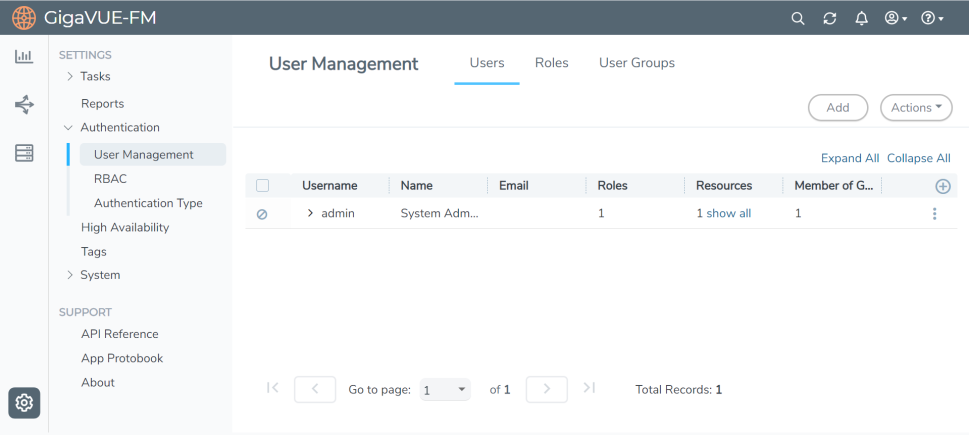Overview of Authentication
Authentication pages are used to configure authentication and authorization settings for GigaVUE‑FM. To view the authentication pages:
-
On the left navigation pane, click
 and select Authentication.
and select Authentication.

The following table describes the pages available when Authentication is selected from the left navigation pane.
|
Page |
Description |
User Management | Manage local user accounts. From here, you can add new accounts, edit existing accounts, or delete users. Refer to User Management for details. |
Device Authentication Services | Manage authentication priority and user mapping settings globally for all the devices managed by GigaVUE-FM. You can also perform LDAP Server and LDAP User Group mapping configurations globally for all the nodes managed by GigaVUE-FM. Refer to User Management for details. |
RBAC | Controls RBAC mode to decide if the user's privileges are controlled by GigaVUE‑FM or the managed device. Refer to RBAC for details. |
Authentication Type (Local, RADIUS, TACACS+, LDAP, Third Party) | Use to configure authentication methods. GigaVUE‑FM can authenticate users against the local user database configured in the User Management or against the external authentication server (LDAP, RADIUS, or TACACS+) or the third party (that is, external organization IdP). Refer to Authentication Type for more details. |
Important: Always use HTTPS to run GigaVUE-FM . Running GigaVUE-FM on other non-secure protocols does not generate IDP metadata.
The following table details the AAA configuration support for the various software versions in GigaVUE-FM and CLI.
|
Software Version |
AAA Configuration in GigaVUE-FM |
AAA Configuration in CLI |
Comments |
|---|---|---|---|
| 5.6.0.0 and Below |
Yes |
Yes |
You can view the AAA settings configured using GigaVUE-FM in CLI and vice-e-versa.
|
|
5.7.00
|
Yes |
Yes |
You cannot view the AAA settings configured using GigaVUE-FM in CLI and vice-e-versa.
|
|
5.8.00 and above |
Yes |
No |
You can configure the AAA settings only using GigaVUE-FM. AAA Configuration using CLI is not supported. |



